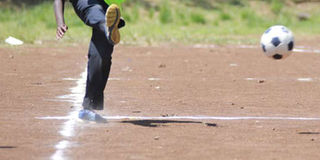RINGSIDE VIEW: Why age cheating in school games needs to end

A player in the Gabonese first division, Herman Tsinga, has died after collapsing during a game in Libreville, local media reported on March 3, 2019. PHOTO | FILE |
What you need to know:
- The school games are generally bound by rules that peg the upper age limit for illegible players at 19 years.
My belated Happy New Year wishes folks! It’s the beginning of another year and its back to school.
Thankfully, going by recent trends, the mad season of setting schools ablaze won’t be upon us again until the second term of schools’ calendar.
Incidentally, that’s around the same time of the year when the annual regional secondary school games usually come around.
Speaking of which, ever wondered how we ended up with a generation of arsonists masquerading as students in our learning institutions? Look no further than the annual regional school games.
Ideally, the schools championships are meant to provide a springboard for budding sportsmen and women to launch their careers in sports, an objective which to a large extent has been achieved over the years.
Yet, a few rogue elements within the organisational structures of the games have continued to jeopardise the very essence of fair play by infringing the spirit of good sportsmanship with impunity.
Year in year out, there has been an endless hue and cry over age cheating, reportedly perpetuated by conniving head teachers and coaches to give their schools undue advantage over the competition.
What is most startling is not the actual malpractice, but the great lengths to which the conspirators of these devious manoeuvres are ever willing to go to attain their end game.
The school games are generally bound by rules that peg the upper age limit for illegible players at 19 years.
Over the years, though, deceitful over-aged students – and non-students, in some cases – in collusion with their equally crooked handlers in the name of teachers and coaches, have managed to circumvent the slack age vetting process to enter the competition as unapologetic impostors.
In 2016, for instance, when Kenya last hosted the games in Eldoret, there was widespread claims that some schools, the hosting ones included, enlisted the services of age-toughened ‘mercenaries’ in the shape of villagers and semi-professional athletes under falsified identities to compete against much younger competitors.
It’s one thing for ineligible students – or non-students, for that matter – to falsify their age for a kick about on the pitch, but it’s another thing all together for glory-thirsty teachers to willingly break the rules of competition through such treachery.
Here is my point.
If a teacher doesn’t give a hoot about blatantly abetting bad sportsmanship tendencies on the field of play, how then do you expect him or her not to aid the self-same over-aged students in exams cheating back in the classroom?
How do you expect a school principal who is obsessed with amassing sports trophies by hook and crook not to employ the same deceitful schemes just to ensure his or her school makes the Top 100 ranking?
Sadly, it doesn’t end there.
A student who cheated his or her way through high school, will most likely show up in campus as the dunderhead who squanders his or her parents’ hard-earned pittance meant for school fees on foolhardy ‘investments’ in the highly addictive sports betting.
More often than not such insolvent ‘investments’ seldom yield any meaningful returns.
It gets worse in learning environments where lecturers with rotten morals have no qualms in coercing their students into illicit sexual relationships in exchange for ‘good’ grades.
Those not shrewd or lucky enough to foster such affairs, are often left to their own devices. Hence, the disgraceful and pervasive ‘Mwakenya’ culture which permeated nearly all Kenyan institutions of higher learning.
The moral of the story? The corrupt leaders we love whining about all the time did not just become corrupt overnight. They were schooled, nurtured and socialised into being corrupt over many years by a society which condones – nay, glorifies – sleaze.
I desperately hope that this year we will see a greater level of fair play when the national and regional school games come around.
But my biggest fear, however, is that for all my desperation, my hopes are highly likely to come to naught.





